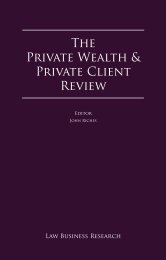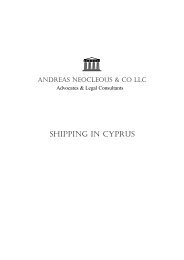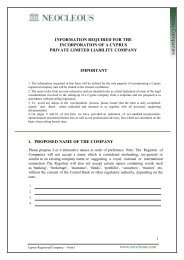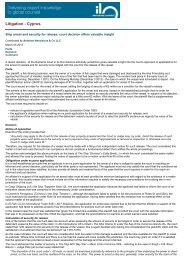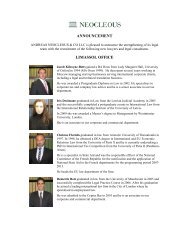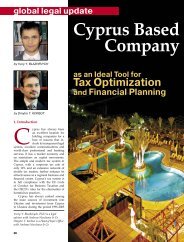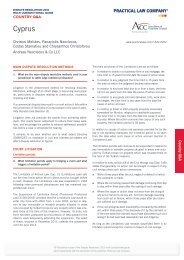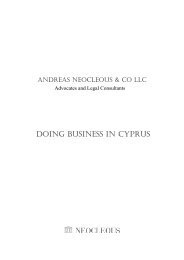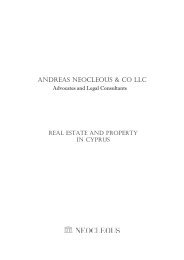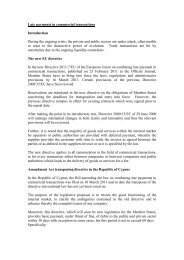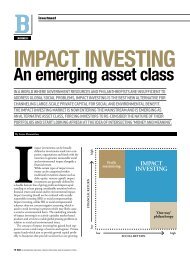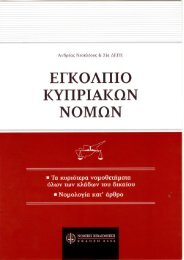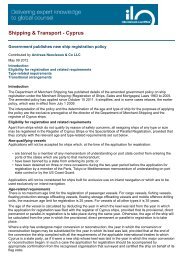Right of free movement for EU citizenship.pdf - Andreas Neocleous ...
Right of free movement for EU citizenship.pdf - Andreas Neocleous ...
Right of free movement for EU citizenship.pdf - Andreas Neocleous ...
You also want an ePaper? Increase the reach of your titles
YUMPU automatically turns print PDFs into web optimized ePapers that Google loves.
Can the right <strong>of</strong> <strong>free</strong> <strong>movement</strong> deriving from Union <strong>citizenship</strong> be<br />
invoked by <strong>EU</strong> citizens in order to regularise the residence <strong>of</strong> their<br />
non-<strong>EU</strong> spouse<br />
Under <strong>EU</strong> law, when a national <strong>of</strong> a Member State resides legally in another<br />
Member State, his or her spouse is allowed to remain with him or her even when<br />
the spouse is not a national <strong>of</strong> an <strong>EU</strong> Member State.<br />
In a case referred to it by the Supreme Court <strong>of</strong> the United Kingdom, the<br />
European Court recently decided that a national <strong>of</strong> a Member State who had<br />
never made use <strong>of</strong> her right <strong>of</strong> <strong>free</strong> <strong>movement</strong> and had always resided in the<br />
Member State <strong>of</strong> her nationality has no right to invoke the rules <strong>of</strong> <strong>EU</strong> law<br />
designed to facilitate the <strong>movement</strong> <strong>of</strong> persons within the territory <strong>of</strong> the Member<br />
States. In its judgment, the European Court stated that Directive 2004/38, which<br />
relates to the right <strong>of</strong> <strong>free</strong> <strong>movement</strong> <strong>of</strong> persons, determines the way in which<br />
European citizens can exercise their right to <strong>free</strong>dom <strong>of</strong> <strong>movement</strong> within the<br />
territory <strong>of</strong> the Member States and the conditions attaching to the exercise <strong>of</strong> that<br />
right. It regulates the rules governing an individual's right to travel and reside<br />
within Member States other than that <strong>of</strong> which he or she is a national, not his or<br />
her Member State <strong>of</strong> nationality.<br />
According to the international law principle reaffirmed in the European<br />
Convention on Human <strong>Right</strong>s and Fundamental Freedoms signed in Rome on 4<br />
November 1950, <strong>EU</strong> citizens residing in the Member State <strong>of</strong> which they are<br />
nationals enjoy the unconditional right <strong>of</strong> residence in that State. The fact that<br />
an individual is a national <strong>of</strong> more than one Member State does not mean that he<br />
or she has already used the right <strong>of</strong> <strong>free</strong> <strong>movement</strong>. Dual nationality does not<br />
<strong>of</strong>fer an automatic right to benefit from the <strong>free</strong>dom <strong>of</strong> <strong>movement</strong> and the rights<br />
conferred by the directive.<br />
In its decision the European Court notes that a person who is national <strong>of</strong> at least<br />
one Member State enjoys the status <strong>of</strong> <strong>EU</strong> citizen and may there<strong>for</strong>e rely on the<br />
rights pertaining to that status and, in particular, the right to move and reside<br />
within the territory <strong>of</strong> the Member States. However, if the individual does not<br />
exercise this right, his or her non-European spouse is not automatically entitled<br />
to the same benefit.<br />
According to the European Court’s ruling, this situation has no connection with<br />
European Union law but is covered exclusively by national law. Under these<br />
circumstances, the right <strong>of</strong> residence in a Member State cannot be based on the<br />
rights <strong>of</strong> European <strong>citizenship</strong>.<br />
The applicability <strong>of</strong> Directive 2004/38<br />
According to article 3(1) <strong>of</strong> Directive 2004/38 all <strong>EU</strong> citizens who move to or<br />
reside in an <strong>EU</strong> Member State other than that <strong>of</strong> which they are a national are
eneficiaries <strong>of</strong> the Directive. The Directive does not set out in detail the<br />
conditions governing the exercise <strong>of</strong> this right.<br />
The provisions <strong>of</strong> article 21 TF<strong>EU</strong> governing <strong>free</strong>dom <strong>of</strong> <strong>movement</strong> <strong>for</strong> persons<br />
and the measures adopted to implement them cannot be applied to situations<br />
which have no factor linking them with any <strong>of</strong> the situations governed by <strong>EU</strong> law<br />
and which are confined in all relevant respects within a single Member State.<br />
The European Court has already stated several times its view that <strong>citizenship</strong> <strong>of</strong><br />
the European Union is the fundamental status <strong>of</strong> nationals <strong>of</strong> its Member States.<br />
A national <strong>of</strong> at least one Member State enjoys the status <strong>of</strong> a Union citizen under<br />
article 20(1) TF<strong>EU</strong> and may, there<strong>for</strong>e, rely on the rights pertaining to that status,<br />
including the right to move and reside <strong>free</strong>ly within the territory <strong>of</strong> the Member<br />
States. However, if there is no element indicating that the national measure at<br />
issue in the main proceedings has the effect <strong>of</strong> depriving an individual <strong>of</strong> that<br />
right, the article is not applicable.<br />
The right to transfer the benefits <strong>of</strong> Union <strong>citizenship</strong> to a non-<strong>EU</strong> Member State<br />
spouse must be applied within the Member State <strong>of</strong> which the Union citizen is<br />
both a national and a resident.<br />
Author:<br />
Law Firm:<br />
Website:<br />
Christos Floridis<br />
<strong>Andreas</strong> <strong>Neocleous</strong> & Co LLC<br />
www.neocleous.com



